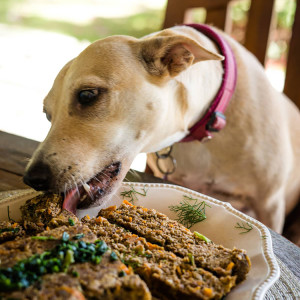Can Dogs Eat Beef Jerky? Experts Explain
Although this one may seem obvious, it’s not so cut and dry.
In This Article:
Can Dogs Have Beef Jerky? What Happens if Dogs Eat Beef Jerky? Beef Jerky Ingredients Harmful to Dogs Potential Risks of Beef Jerky Benefits of Beef Jerky What to Do if Your Dog Eats Too Much Beef Jerky How to Make Beef Jerky That’s Safe for Your Dog
Alternative Treats to Beef Jerky
The very name “beef jerky” sounds like something a dog would eat. You may think it’s protein-packed, chewy, tasty, and therefore, perfect for your dog. And when we see those big, pleading eyes, we want to share anything with our pup.
But many foods we eat aren’t safe for our dogs, and it’s a pet parent’s responsibility to find out which ones those may be. So what about beef jerky? The answer is not so simple: It’s maybe. This depends on several factors, including ingredients, preparation, and portion size.
How much do you spend on your pet per year?
Can dogs have beef jerky?
Many jerky products made for humans contain additives and spices. These can upset your dog’s stomach or worse. But beef jerky without harmful additives and spices can be a safe, high-protein treat for them. In fact, you can find jerky made just for dogs, or you can make your own.
What happens if dogs eat beef jerky?
If a dog eats a commercially made piece of beef jerky marketed for people, it’s quite likely that they may suffer from digestive problems or more serious health issues. (Store-bought jerky not made for dogs may very well have garlic, onion, or high amounts of salt.) If, on the other hand, a dog eats a small piece of plain, unseasoned beef jerky, they might be just fine. Reactions vary depending on the amount and the dog’s size, age, and sensitivity.
Beef jerky ingredients that can be harmful to dogs
Here are some common jerky ingredients that can be harmful to dogs:
Garlic and onion powder: can damage red blood cells and cause anemia
Xylitol: a sugar substitute that’s extremely toxic to dogs, even in tiny amounts
Excess sodium: may lead to salt poisoning or dehydration
Spices and chili powder: can irritate the digestive system and cause vomiting or diarrhea
Preservatives: nitrates and nitrites may be harmful in large quantities over time
Potential risks of giving your dog beef jerky
Giving your dog jerky that’s not made specifically for them comes with several risks.
Digestive upset: High-sodium content can cause vomiting, diarrhea, or discomfort.
Toxicity: Ingredients like xylitol, garlic, or onion
Salt poisoning: Too much sodium can cause symptoms like excessive thirst, confusion, or tremors.
Choking or blockages: This can especially happen to small dogs or if the jerky is swallowed without chewing.
Pancreatitis: High-fat jerky can inflame the pancreas, especially in dogs prone to this condition.
Are there benefits to feeding your dog beef jerky?
Definitely, but only when it’s made safely. Nutritional benefits include the following.
High-protein content: This supports muscle maintenance and energy levels.
Low in carbs: Beef jerky is great for dogs on low-carb or grain-free diets.
Long-lasting chew: It helps reduce boredom and can support dental health.
Always serve jerky in moderation, and make sure it fits your dog’s overall caloric needs. Remember, it’s a treat, not a meal.
What to do if your dog eats too much beef jerky
If your dog gets into a bag of jerky meant for humans, take it seriously. The degree of risk corresponds to the amount eaten and the ingredients.
Symptoms to watch for
Monitor your dog closely for these signs:
Pale gums (may indicate anemia)
Tremors, seizures, or disorientation
Loss of appetite
Lethargy or weakness
Drooling or pawing at the mouth
Vomiting or diarrhea
Excessive thirst or urination
Contact your vet immediately if symptoms occur or if you’re unsure about the jerky’s ingredients.
How to make beef jerky safe for your dog
Here are some tips to make your own beef jerky for your dog.
Use plain, lean meat: no seasoning, sauces, or marinades
Avoid harmful ingredients: absolutely no onion, salt, or artificial preservatives
Cut into small strips: to make it easier to chew, harder to choke on, and easier to digest
Dehydrate properly: either in a dehydrator or a low-temperature oven to remove moisture and reduce the risk of spoilage
Store correctly: storing in an airtight container in the fridge or freezer will keep it fresh and bacteria-free
How to make homemade beef jerky for your dog
Here’s a simple recipe you can try at home.
Ingredients:
Lean beef (round, sirloin, or flank steak)
Instructions:
Slice meat into thin strips (about one-fourth of an inch thick).
Preheat oven to 160 degrees Fahrenheit to 170 degrees Fahrenheit, or use a dehydrator.
Place strips on a wire rack over a baking sheet.
Dry for six to eight hours, flipping halfway through.
Let cool, then store in an airtight container in the fridge (up to two weeks) or freezer (up to 3 months).
This method ensures a safe, preservative-free treat your dog can enjoy.
Alternative treats to beef jerky
If you’d rather not risk beef jerky, try these safer alternatives:
Dehydrated sweet potatoes
Freeze-dried meats available at pet stores that are usually single-ingredient
Air-dried liver treats
Vegetable sticks, such as carrots, cucumbers, and green beans
Bottom line
Beef jerky isn’t necessarily off-limits, but you should use caution if your dog wants some.
If it’s plain, homemade, or designed specifically for dogs, jerky can be a great occasional treat.
However, many store-bought jerky snacks made for humans contain dangerous ingredients for dogs.
Always read labels, avoid risky additives, and when in doubt, consult your vet before sharing.
FAQs
Can puppies eat beef jerky?
It’s best to keep beef jerky away from puppies for at least six months. There are too many choking hazards, and their digestive tracts are sensitive.
Can dogs eat beef jerky?
Dogs can eat beef jerky, but only if it’s plain, unseasoned, and made without harmful ingredients. Jerky made for humans should generally be avoided.
Can dogs eat Jack Link’s beef jerky?
No, Jack Link’s and similar brands often contain dangerous ingredients, such as garlic and onion powder, as well as high levels of salt and sugar.
Can beef jerky cause blockages in dogs?
Yes, beef jerky can cause blockages in dogs, especially if large or tough pieces are swallowed without chewing. Small dogs and dogs who gulp food are particularly at risk.
Is human beef jerky safe for dogs?
Most human beef jerky is unsafe for dogs due to seasonings, preservatives, and additives. If you read the label and there are no preservatives, seasonings, or additives, and the contents are just meat, then it’s probably safe. The safest thing is to stick to dog-specific jerky or make your own.
References
Fascetti, Andrea J, and Sean J Delaney. Feeding the Healthy Dog and Cat. 23 Aug. 2023, pp. 106–135, ch7. https://doi.org/10.1002/9781119375241opens in new tab.
Nybroe, Stinna, et al. “Outcome of Acquired Fanconi Syndrome Associated with Ingestion of Jerky Treats in 30 Dogs.” Animals, vol. 12, no. 22, 18 Nov. 2022, p. 3192. https://doi.org/10.3390/ani12223192opens in new tab.
Rotstein, David, et al. “Pet Food-Associated Dietary Exogenous Thyrotoxicosis: Retrospective Study (2016-2018) and Clinical Considerations.” Topics in Companion Animal Medicine, vol. 43, 5 Feb. 2021, p. 100521, www.sciencedirect.com/science/article/pii/S1938973621000143, https://doi.org/10.1016/j.tcam.2021.100521opens in new tab.









